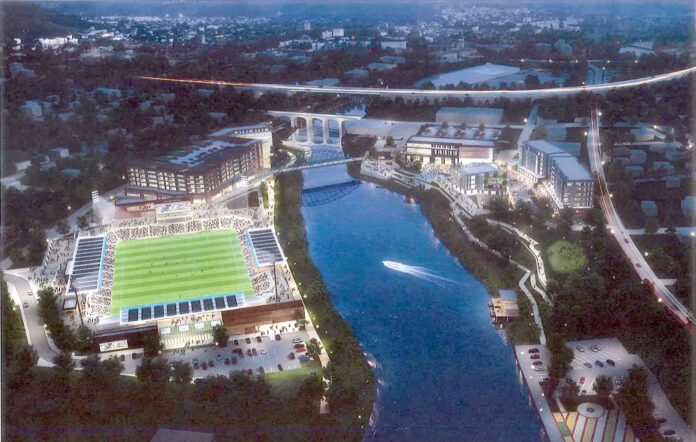
PAWTUCKET – The pieces of the complex financing puzzle for a riverfront soccer stadium development are shifting yet again, with the city now planning to use federal stimulus money – rather than a revenue bond – to help pay for the project.
After inflation and supply chain woes spiked costs for the Tidewater Landing development, including a 50% hike to the soccer stadium cost to $124 million, Pawtucket agreed to kick in another $10 million. Initially, the money was going to come from a net $10 million in revenue bonds issued by the quasi-public Pawtucket Redevelopment Agency, with the debt repaid using property and tangible taxes on the stadium.
That’s still an option under the amended financing and development documents approved by the Pawtucket City Council Tuesday, but no longer the top choice. Instead, the city administration recommends using a portion of its American Rescue Plan Act Funds and Community Development Block Grant money to cover that $10 million, Dylan Zelazo, the city’s chief of director of administration told the council Tuesday.
Zelazo explained that the switch to grant funding rather than tax-increment financing avoids the issuance and interest costs tied to revenue bonds. And without $10 million in debt to pay back, the money from the stadium taxes can go directly into the city’s general fund to spend on “relief for taxpayers, other city services” or whatever else the council decides, Zelazo said.
Council members overwhelmingly approved the amended master plan, lease and tax stabilization agreements which outline the updated project plans and financing. But they also questioned the protections for the city and its taxpayers if the rest of the mixed-use development (residential, retail, office and public infrastructure) doesn’t get built.
“I could care less about the soccer stadium, the soccer team, all of that,” said Councilwoman Melissa DaRosa, who left the meeting before the votes. “I am really excited about the other development, the housing, the pedestrian bridge, the businesses and people coming to the city.”
DaRosa continued, “How do we make sure we can even really do this, and it doesn’t come down to us being stuck with a stadium alone?”
Her concerns echoed those of R.I. Commerce Corp. board members when asked to approve changes to the $36.2 million in state and city tax-increment financing that shifted nearly all of the money into the first-phase stadium project to cover the cost hikes, leaving virtually nothing left for the later residential, retail and infrastructure. R.I. Commerce narrowly approved the funding change, with Gov. Daniel J. McKee casting the tie breaking vote, but critics have continued to highlight the financial risks to the state if the stadium proves less profitable than expected, or if the critical housing and infrastructure components never come to fruition.
Jeremy Savage, an attorney representing the city in the project negotiations, pointed to protections in the updated agreements such as a completion guarantee that ensures that developer Fortuitous Partners will be responsible for any future cost overruns on the first phase of the project, as well as clauses to the lease that put the land back in the city’s hands if the developer defaults on the agreed-upon financing, timeline and construction benchmarks.
“There’s no question, for this project to realize its massive potential for the city, the whole thing has to be finished,” Savage said. “I’ve negotiated hard to try to get as many strings tied to the developer to ensure we see the full completion of the project.”
In addition to the flagship, United Soccer League stadium, the project is also slated to include 435 housing units along with retail and commercial space, an outdoor event plaza and a riverwalk connecting the two sides of the Pawtucket River. The entire development is expected to create 474 direct construction jobs and 162 permanent ones, and generate $37 million in state tax revenue over the next 30 years, according to an analysis by an R.I. Commerce consultant.
Daniel Kroeber, director of development for Fortuitous Partners, told the council that the company was committed to building the housing and other development “immediately” after the stadium is up and running. The 10,000-seat stadium, home to the newly named “Rhode Island F.C.,” is scheduled to open for its first season in 2024.
The developer has also agreed to pay $10 million in city property and tangible taxes on the stadium site over the first 20 years under a revised tax treaty approved Tuesday. The $10 million tax bill is substantially higher than the original tax treaty, under which the city agreed to charge the developer just $35,000 for the first 20 years. However, it still represents a discount over the full property taxes, which are projected to reach $1.9 million after the development is finished, according to the agreement.
Similar to the prior treaty, the property will be taxed at the full rate after the 20-year tax treaty ends.
The new tax treaty was unanimously approved by the city council, while the updated master development agreement and ground lease were approved by a 7-1 vote, with Councilwoman Alexis Schuette voting against both.
Also on Tuesday, the council voted 6-2 on a resolution authorizing the city to sign any documents needed to issue the $27 million in state revenue bonds. The Pawtucket Redevelopment Agency is aiming to sell the bonds by the end of the year, Zelazo told PBN previously. Schuette and Councilman Clovis Gregor voted against the resolution.
On top of the city and state revenue bonds, the developer has agreed to put in another $45 million in private equity and $31 million in private debt investment to cover the higher costs of the stadium.
R.I. Commerce has also authorized $10 million in net state tax credits for the project.
Nancy Lavin is a PBN staff writer. You may reach her at Lavin@PBN.com.












